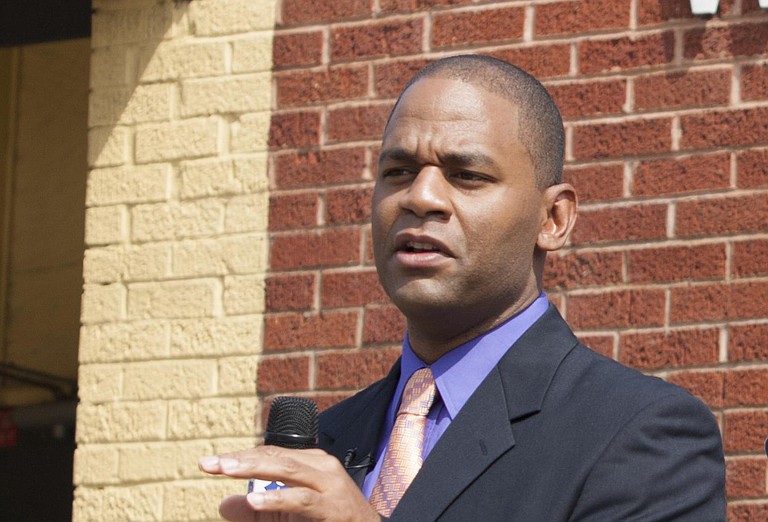De’Keither Stamps, a retired Marine, says he is ready take his leadership experience to City Hall. Photo by Jacob Fuller.
Wednesday, March 20, 2013
De'Keither Stamps
Born: Jackson
Age: 36
Family: Divorced, three daughters: Jasmine, 15, Christian, 7, and Kennedi, 4
Education: Attended Forest Hill High School; graduated from Crystal Springs High School 1995
De'Keither Stamps has worn many hats: farmer, Marine, Army patrolman, veteran's advocate and public speaker. This summer, he hopes to add Ward 4 Jackson city councilman to that list.
Stamps grew up in west Jackson, not far from a farm where his family has raised cows and grown hay for generations. Stamps said he learned his work ethic on that farm, where he worked hard every day after school.
Long before graduating from high school, Stamps knew what he wanted to do when he completed his secondary education: join the U.S. Marine Corps.
Soon after signing up, Stamps joined the presidential security team for President Bill Clinton. He served four years in that role, including guarding Clinton during his 1996 re-election campaign.
After leaving the presidential security team, Stamps spent time as a security officer at the U.S. embassies in Dar es Salaam, Tanzania; Nairobi, Kenya; Geneva, Switzerland; and London. Stamps got out of the Marine Corps in 2002, but when the Iraq War began in 2003, Stamps tried to join the fight.
"I couldn't be in the military and not be in the big show of my generation," Stamps said.
When the Marines wanted to send Stamps back to embassy security instead of Iraq, he stormed out of the recruiting office and slammed the door.
"The Army recruiter was standing outside his office," Stamps said. "He said, 'Hey man, what's wrong?' I was like, 'All I want to do is go to Iraq, man.' ... A few months later, I found myself as a patrol leader of a 17-man, 4-vehicle patrol in Tikrit, Iraq."
Today, Stamps is once again a retired veteran, and he is on his first campaign trail.
If elected to the City Council, what will be your top priority once in office?
The culture here in Ward 4, specifically. Before you can lay a foundation for a better community, you have to create a better culture. We've got a rich history, and we just need to build on it.
Other communities are growing. We can do the same thing. It starts with academics, business and community. Our schools are vital. How we (improve that) is linking our education system to our very survival, (making sure) children understand that your survival is linked to your education, and (that) the teacher understands your community survival is based on their ability to teach that child.
How, specifically, can you change the culture?
Leadership. Our community is dwindling because we need more effective leadership. I'm here to provide that leadership, not just on the government side but in the community as well. We have a lot of organizations in the community that are for the community. We just have to corral them and point them in the right direction.
You brought up education. JPS faced possibly losing its accreditation last summer. How could you work from City Hall to help change that negative culture in the education system?
First and foremost, we've got to reward the teachers. We've got some quality teachers and administrators in the JPS system. We may not have the funds immediately to give them all a raise, but the city owns plenty of property. Why don't we just reward our teachers that we're losing because they're not on the tax roll? Even if we give it to them, at least it would get back on the tax roll, and give them a way to accumulate wealth and build a better future. It would let them know we appreciate them with what we have.
Rewarding our teachers is first and foremost. Like I said before, linking our very survival to education, and everybody getting that ingrained inside their minds--that we will not survive unless we educate the children and let these children learn.
Are you talking about taking these abandoned properties that the city has taken over and giving the houses and property to teachers?
Exactly. It would solve several problems. The city is paying to maintain it, and it's not producing any money on the tax roll. That's just one solution. I've got binders full of ideas and solutions.
Even beyond that, we've never fully funded education properly. There are ways we can do that. We can do things as a city government, (such as) all new hires must live in the city of Jackson. That's something that we can do, because city council writes the rules. That will spur economic growth. Instead of hiring people in other communities, hire somebody that lives in Jackson.
You talked about funding. Right now, it seems that the city may have trouble funding much of anything other than infrastructure, because we're looking at hundreds of millions of dollars in water, sewer and street improvements. If you're elected, what will be your top infrastructure priority, and how will you look to fund it?
First, we're not the only municipality who uses infrastructure in Jackson. We must work together with our surrounding cities, who also use the same infrastructure, whether it be to travel on or to drink from. All of us have the problem. It's not advantageous for Byram to go and fully fund their own water-treatment plant. Since it's not, it's advantageous for them to continue with the relationship, but shoulder some of this with us, so that we can all solve all of our problem. If it all goes bad, everybody's water stops.
So what if you go to the leaders of these other cities and ask for this, and they ask why they would want to give money to Jackson?
(I'd say) because they're using the infrastructure. It's cheaper to help assist in shouldering the burden for infrastructure than to build your own.
The city has been looking to a local-option sales tax to fund the infrastructure improvements. The current mayor is refusing to start that tax process under the current system, where he does not have control over who sits on the commission that determines where the tax money goes. Would you support the 1-cent sales tax under the current law?
If we are going to raise our taxes, but not have the full say in how we're going to use that revenue? That's not advantageous for the city of Jackson. I won't support things that are not good for the city of Jackson, because that's mostly our tax dollars.
I want to make sure that those resources are put specifically for helping everyone, not just funneled to an outside community and still leaving Jackson with the bigger burden of the expenses. We definitely need more say in how the money is spent.
How important is it for Jackson to put money into these developments that are aimed at making the city a tourist destination?
One-third of America lives within 500 miles of Jackson, a little over 100 million people. Jackson becoming a tourist destination is definitely possible. We can do it. We're centrally located. We just have to have a reason for people to stop.
Crime is always going to come up in Jackson. We have a crime perception problem, if not a major crime problem. How could you, as a councilman, change that?
People who have jobs don't run around breaking into folks' houses much. There are only three things you can do in America. You can work. You can get on welfare. And you can commit crime. Based on your economic situation, some people do all three at the same time. The majority of people in Jackson just want to work.
There's only two types of people in Jackson: the people who could afford to leave and didn't, and the people who couldn't afford to leave and stayed. Regardless, we're here and we're not going anywhere. We're boiled down to the faithful, 174,000 people. We can build a city right here, just focus on us.
I guess you're saying the answer to the crime is to get people to work?
Right. Economic development pushes crime out. It also builds our schools and makes our communities better.
Read all Jackson City Council interviews to date at jfp.ms/citycouncilrace2013.



Comments
Use the comment form below to begin a discussion about this content.
Sign in to comment
Or login with:
OpenID